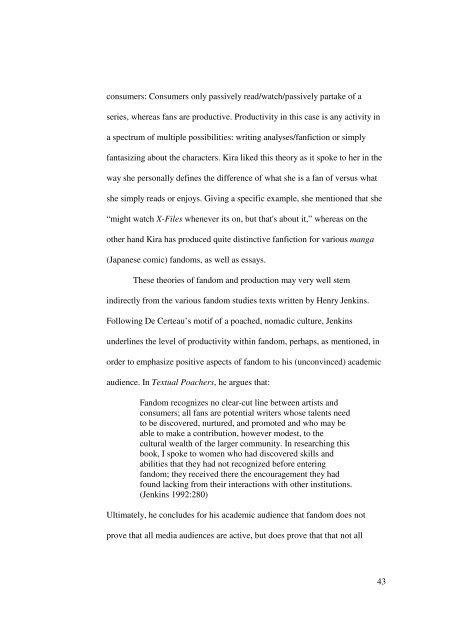Girls who like Boys who like Boys – Ethnography of ... - Yuuyami.com
Girls who like Boys who like Boys – Ethnography of ... - Yuuyami.com
Girls who like Boys who like Boys – Ethnography of ... - Yuuyami.com
You also want an ePaper? Increase the reach of your titles
YUMPU automatically turns print PDFs into web optimized ePapers that Google loves.
consumers: Consumers only passively read/watch/passively partake <strong>of</strong> a<br />
series, whereas fans are productive. Productivity in this case is any activity in<br />
a spectrum <strong>of</strong> multiple possibilities: writing analyses/fanfiction or simply<br />
fantasizing about the characters. Kira <strong>like</strong>d this theory as it spoke to her in the<br />
way she personally defines the difference <strong>of</strong> what she is a fan <strong>of</strong> versus what<br />
she simply reads or enjoys. Giving a specific example, she mentioned that she<br />
“might watch X-Files whenever its on, but that's about it,” whereas on the<br />
other hand Kira has produced quite distinctive fanfiction for various manga<br />
(Japanese <strong>com</strong>ic) fandoms, as well as essays.<br />
These theories <strong>of</strong> fandom and production may very well stem<br />
indirectly from the various fandom studies texts written by Henry Jenkins.<br />
Following De Certeau’s motif <strong>of</strong> a poached, nomadic culture, Jenkins<br />
underlines the level <strong>of</strong> productivity within fandom, perhaps, as mentioned, in<br />
order to emphasize positive aspects <strong>of</strong> fandom to his (unconvinced) academic<br />
audience. In Textual Poachers, he argues that:<br />
Fandom recognizes no clear-cut line between artists and<br />
consumers; all fans are potential writers <strong>who</strong>se talents need<br />
to be discovered, nurtured, and promoted and <strong>who</strong> may be<br />
able to make a contribution, however modest, to the<br />
cultural wealth <strong>of</strong> the larger <strong>com</strong>munity. In researching this<br />
book, I spoke to women <strong>who</strong> had discovered skills and<br />
abilities that they had not recognized before entering<br />
fandom; they received there the encouragement they had<br />
found lacking from their interactions with other institutions.<br />
(Jenkins 1992:280)<br />
Ultimately, he concludes for his academic audience that fandom does not<br />
prove that all media audiences are active, but does prove that that not all<br />
43


